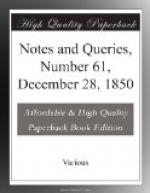On “coming to himself,” he got up and found his way home, where he “took to his bed, and never left it again, but died a little while after,” the victim (I suppose) of delirium tremens, or some such disorder, the incipient symptoms of which his haunted fancy turned into the sweet music in the night wind and the fairy revel on the heath. In the tale I have above given he persisted (said the old man), when the medical attendant who was called in inquired of him the symptoms of his illness. This occurrence happened, I understood, very recently, and was told to me in perfect good faith.
I have just been told of a man who several years ago lost his way on Whitchurch Down, near Tavistock. The farther he went the farther he had to go; but happily calling to mind the antidote “in such case made and provided,” he turned his coat inside out, after which he had no difficulty in finding his way. “He was supposed,” adds my informant, “to be pisky-led.”
About ten miles from Launceston, on the Bodmin road (or at least in that direction) is a large piece of water called Dosmere (pronounced Dosmery) Pool. A tradition of the neighbourhood says that on the shores of this lonely mere the ghosts of bad men are ever employed in binding the sand “in bundles with beams of the same” (a local word meaning bands, in Devonshire called beans; as hay-beans, and in this neighbourhood hay-beams, for hay-bands). These ghosts, or some of them, were driven out (they say “horsewhipped out,” at any rate exorcised in some sort) “by the parson” from Launceston.
H.G.T.
Launceston.
Straw Necklaces (Vol. i., p. 104).—Perhaps these straw necklaces were anciently worn to preserve their possessors against witchcraft; for, till the thirteenth century, straw was spread on the floors to defend a house from the same evil agencies. Cf. Le Grand d’Aussi Vie des Anciens Francs, tom. iii. pp. 132. 134; “NOTES AND QUERIES,” Vol. i., pp. 245. 294.
JANUS DOUSA.
Breaking Judas’ Bones.—On Good Friday eve the children at Boppart, on the Rhine, in Germany, have the custom of making a most horrid noise with rattles. They call it breaking the bones of Judas. Cf. “NOTES AND QUERIES,” Vol. i., p. 357.
JANUS DOUSA.
LOCAL RHYMES AND PROVERBS OF DEVONSHIRE.
“River of Dart, oh river
of Dart,
Every year thou claim’st
a heart.”
It is said that a year never passes without the drowning of one person, at least, in the Dart. The river has but few fords, and, like all mountain streams, it is liable to sudden risings, when the water comes down with great strength and violence. Compare Chambers’ Popular Rhymes, p. 8., “Tweed said to Till,” &c. See also Olaus Wormius, Monumenta Danica, p. 17.
The moormen never say “the Dart,” but always “Dart.” “Dart came down last night—he is very full this morning.” The cry of the river is the name given to that louder sound which rises toward nightfall. Cranmere Pool, the source of the Dart, is a place of punishment for unhappy spirits. They may frequently be heard wailing in the morasses there. Compare Leyden Scenes of Infancy, pp. 315, 316., &c.




